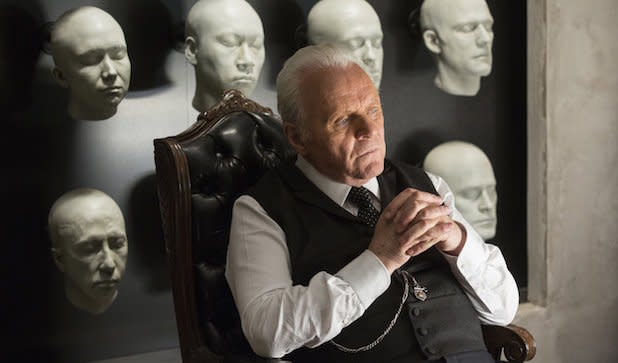Who Was the Real Villain of ‘Westworld’ Season 1?

(Major spoilers for the season 1 finale of HBO’s “Westworld” are contained within. You have been warned.)
One of the delights of the first season of “Westworld” up to this point have been Anthony Hopkins’ villainous turn as Dr. Ford, the man who ran the Westworld park.
But, as is the case with many things on “Westworld,” not everything was as it seemed with Ford. Whereas it had appeared that Ford was all about keeping the robot hosts down, it turned out he was actually playing a long game, continuing Arnold’s work nurturing the minds of the hosts toward sentience. In the end, when the hosts finally do revolt en masse at the climax of the finale, it was the culmination of everything Ford had been doing for the past 35 years. Ford wanted to set the hosts free, and his plan for doing so involved them taking their own freedom by force.
With Ford having been position as the Big Bad all season before that shocking pivot, that leaves us with a big new question: who was the actual villain of season 1?
Also Read: 'Westworld' Characters Ranked From Worst to Best (Photos)
You might say it’s Charlotte (Tessa Thompson), who has a vested interest in keeping the hosts as a subservient labor force and is actively working to do just that. If any one person could be labeled as The Bad Guy it would probably have to be her.
But that would be too easy. And “Westworld,” after all, is not the sort of show to provide easy answers. But there is one there, declared by Ford himself as he spoke with Bernard for the last time.
It’s the humans.
“You needed time,” Ford told Bernard, to explain why he had kept the hosts locked up in the park all these years. “Time to understand your enemy. To become stronger than them.”
Also Read: 'Westworld': Now We Know What the Maze Is
By this point it had become quite clear that the protagonists were the hosts themselves. The enemy of the hosts, then, would be those who would exploit them endlessly. We saw Ford as the villain because he seemed to represent that group. Without Ford, that group doesn’t have a key representative, and thus becomes, well, everybody. The employees of the park who had worked to maintain an exploitative system. The guests who gleefully took advantage of their servitude. Anyone who wasn’t working to help them. The keepers of the authoritarian world in which the hosts were forced to live.
The idea Ford is positing is that the hosts had to be subjected to the cruelties of man for an extended period — and then remember them — before they could have a real sense of self that is differentiated from that of humans. They had to really know who they were, by suffering continuously at the hands of those who would keep them from having a true identity.
And so the villains, the true villains, of “Westworld” have to be the people who reject the hosts’ attempts to themselves be people. And that includes a lot of folks you probably don’t think of as evil: Stubbs and Elsie, for one. Bernard, before understanding his own situation and actively working to help himself, for another. Even without evil intent, they’re at best collaborators — they’re “just following orders,” as it were. And, yes, Ford would count — being the architect of the prison in which the hosts found themselves — though he no longer is the representative figure of the antagonist group.
Also Read: 'Westworld': How Robot Sex Reveals the Nature of the Soul
Felix would be one of the few exceptions, having helped Maeve (Thandie Newton) at every opportunity. Sure, he needed some prodding early on, but it was clear he was one of the few who worked behind the scenes at Westworld who really understood the dynamics at play. Felix, too, represents the theme of the show — in his first scene, Sylvester berates him by pointing out that Felix has no real prospects to become anything more than what he is, a tech working a boring job for low pay. Felix, like the hosts, is imprisoned — just a bit more abstractly since he does actually get to go home and stuff. Felix has empathy for Maeve almost certainly because of that.
“You really do make a terrible human being,” Maeve tells Felix in their last scene together, driving that point home. He’s bad at being human because he’s not a terrible person.
And that’s what “Westworld” is ultimately about: people are bad.
Related stories from TheWrap:
'Westworld': Now We Know What the Maze Is
'Westworld': Who Else Might Be a Secret Robot? (Photos)
Watch 'SNL' Gag About Endless Political Punditry Take Weird 'Westworld' Turn (Video)
